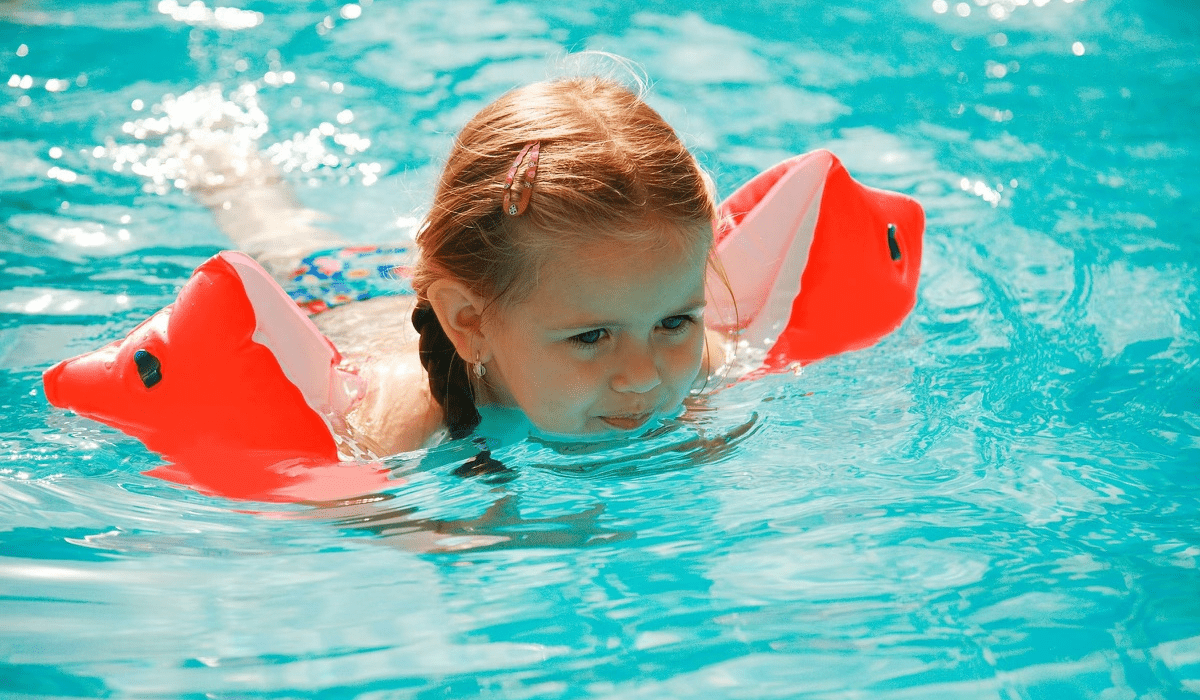Finding the Right Swim Lessons: More Than Just Proximity
Embracing Your Child’s Unique Needs: Finding the right swim lessons goes beyond mere proximity. It’s about discovering a haven where joy meets progress, where your child’s unique needs are embraced and nurtured.
Creating a Positive Environment: Imagine a world where laughter echoes across the pool, and personalized encouragement unlocks breakthroughs instead of tears. Think playful splashes, not forceful dunks. These instructors become allies, not enforcers, guiding young swimmers with patience and positive reinforcement. This approach fosters a lifelong love for the water—encouraging delight, not dread.
The Guide to Tailored Swim Instruction
Nurturing Skills and Strength: This guide is crafted to help parents understand how tailored instruction can nurture both physical skills and mental strength. We avoid harsh tactics or negativity. Forget the “toughest thing you’ll watch” scenarios. We believe in celebrating:
- Every splash
- Every giggle
- Every conquered fear
Exploring Key Elements: We will explore eight research-backed elements that differentiate exceptional swim programs. In these programs, confidence blooms alongside competence, and every child discovers their own aquatic rhythm.

Table of Contents
- Introduction
- Overview of Choosing Swim Lessons
- Specialized Infant/Toddler Training
- Key Benefits and Techniques
- Current Emergency Certifications
- Essential Instructor Qualifications
- Evolving Instructional Approaches
- Modern, Effective Teaching Methods
- Personalized Focus Through Solo Lessons
- Benefits of Individualized Instruction
- Extra Safety Screening
- Ensuring Instructor Credibility
- Staying Updated Through Professional Memberships
- Importance of Continuing Education
- Adaptable Praise and Teaching
- Celebrating Individual Milestones and Flexible Teaching Styles
- Conclusion
- Recap and Final Recommendations
#1 Specialized Infant/Toddler Training

While any certified swim instructor can teach the basics, when it comes to your precious young explorer, prioritizing specialized infant/toddler training makes a world of difference. Here’s why it’s the first ripple in choosing the perfect guide:
Mastering the Art of Tiny Teachers: 180+ hours isn’t just a number; it’s a deep dive into understanding the unique psychology and development of little ones. These instructors learn to speak their language – not just words, but cues, fears, and bursts of joy. They translate swimming skills into engaging playtime, turning every splash into a milestone.
Building Early Lifesaving Skills: Beyond fun and games, these specialized instructors are equipped to nurture essential early self-rescue skills. It’s not about drills and pressure; it’s about weaving safety into every playful interaction. Imagine rolling onto their backs becoming a fun game, kicking to the edge a thrilling adventure. Your little one won’t just be learning to swim; they’ll be building a foundation of confidence and competence in the water.
Nurturing Trust and Comfort: The pool shouldn’t be a source of anxiety for your child. With specialized training, instructors become gentle guides, creating a safe and supportive environment where trust blossoms. They understand how to navigate fears, celebrate successes, and build lifelong bonds that make learning an effortless journey.
Building a Strong Foundation for the Future: Early experiences shape us, and in the water, the right foundation can ripple into a lifelong love for swimming. Specialized instructors don’t just teach strokes; they cultivate confidence, curiosity, and a deep respect for the water. This sets the stage for future aquatic adventures, from recreational swimming to competitive pursuits.
#2 Current Emergency Certifications

Sure, CPR and water safety certifications are essential for any swim instructor. But when it comes to your precious little water explorer, you deserve more than just a piece of paper. Here are some key qualities to look for:
- Experience with infants and toddlers: Choose an instructor who understands the unique developmental needs and anxieties of young children. Look for credentials like Infant Aquatics Instructor (IAI) or Swim Instructor Trainer (SIT) certifications.
- Proven safety practices: Observe how the instructor prioritizes safety during lessons. Do they conduct regular equipment checks? How do they handle unexpected situations? Are they trained in the latest emergency procedures?
- Nurturing and patient demeanor: Infants and toddlers learn best in a calm and supportive environment. Look for an instructor who is gentle, encouraging, and able to build trust with young children.
- Focus on play-based learning: Early swim lessons should be fun and engaging, not stressful. Look for an instructor who incorporates songs, games, and water toys to make learning an enjoyable experience.
- Communication with parents: Clear communication is crucial. Look for an instructor who keeps you informed about your child’s progress and addresses any concerns you may have.
By prioritizing these qualities, you can choose an instructor who will not only keep your little one safe in the water but also nurture their confidence and love for the aquatic world.
#3 Evolving Instructional Approaches
The best swim programs involve instructors who are part of global teaching networks, sharing and implementing the latest, evidence-backed teaching methods. This commitment to improvement means your child receives the most effective and modern swim education.
#4 Personalized Focus Through Solo Lessons

- Tailored Skill Development: Instead of a one-size-fits-all approach, solo lessons allow instructors to identify and address your child’s specific strengths and weaknesses, crafting a learning plan that maximizes their progress. This ensures they’re not held back by the pace of others and can confidently conquer each milestone at their own speed.
- Confidence-Building Individualized Support: Learning to swim can be an intimidating experience, especially for young children. In solo lessons, the instructor becomes a dedicated guide, readily available to address anxieties, celebrate triumphs (big or small!), and offer personalized encouragement. This supportive environment fosters confidence and encourages children to explore the water without fear.
- Faster Progress with Focused Feedback: With multiple children in a group, immediate feedback and corrections can be limited. Solo lessons provide a concentrated learning environment where every kick, stroke, and splash receives the instructor’s full attention. This constant feedback allows for swift adjustments and optimizations, ultimately leading to faster progress and accelerated skill development.
#5 Extra Safety Screening
Peace of mind is priceless, especially when entrusting your child’s well-being to a swim instructor. Look for instructors who undergo rigorous and annually reviewed background checks, like Trustline and Livescan. These comprehensive vetting processes provide an extra layer of assurance, ensuring your child learns in a secure and supportive environment.
#6 Staying Updated Through Professional Memberships

Swimming methods and technology are constantly evolving, and instructors connected to networks like the National Drowning Prevention Alliance (NDPA) stay at the forefront of these advancements. This means your child learns with the latest teaching methods, safety protocols, and engaging resources, ensuring a fun and effective learning experience.
#7 Adaptable Praise Centered on Individual Milestones

Swimming lessons shouldn’t just be about mastering floats and conquering fears. They should be a springboard for confidence, joy, and a lifelong love for the water. That’s why recognizing and celebrating each child’s unique progress is absolutely vital. Imagine the difference between a generalized “good job” and an instructor who:
- Spots and praises tiny triumphs: From kicking for the first time to blowing bubbles underwater, every milestone deserves recognition. This personalized attention tells your child, “I see you, and I’m proud of you!”
- Tailors celebrations to individual interests: Does your child love high fives, silly songs, or a superhero sticker for each accomplishment? Instructors who understand and celebrate individual preferences make learning even more fun and rewarding.
- Connects progress to a sense of accomplishment: Instead of simply praising results, help children understand how their effort and practice led to their success. This fosters a growth mindset and encourages them to keep striving for new goals.
- Transforms setbacks into learning opportunities: Even slip-ups are valuable moments for growth. Instructors who celebrate “almosts” and help children learn from mistakes create a safe and supportive environment where everyone feels comfortable taking risks and exploring new possibilities.
#8 Fixed Lesson Scripts
Avoid instructors stuck on autopilot. Choose those who flex their teaching muscles, adapting lessons to each child’s progress and embracing exploratory play. This isn’t about rigid routines; it’s about letting kids discover their own aquatic rhythm, one water fight at a time. Picture your child, not bound by rote drills, but giggling through a pool noodle obstacle course or chasing bubbles like mischievous mermaids. These instructors celebrate individual strengths, tailoring lessons to the cautious explorer and the water-loving daredevil alike. Every splash becomes a victory, every playful challenge a confidence booster. Forget cookie-cutter lessons; this is where aquatic adventures blossom, nurturing happy, confident little swimmers ready to make a splash both in and out of the pool.
In summary, when selecting swim lessons for your child, consider instructors who offer short, frequent sessions of 10 to 20 minutes, 4 to 5 days a week. This frequency is key for early learning, fostering repetition and muscle memory while accommodating a young child’s attention span. These focused, regular lessons, combined with the 13 crucial factors discussed earlier, provide a comprehensive framework for choosing a swim program that effectively nurtures your child’s swimming skills, safety awareness, and overall confidence in the water.





